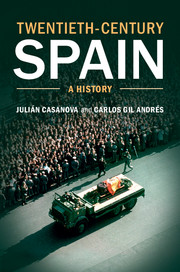Book contents
- Frontmatter
- Contents
- List of illustrations
- Key figures
- List of abbreviations
- Twentieth-century Spain timeline
- Maps
- Introduction
- Part I The monarchy of Alfonso XIII
- 1 The legacy of a century
- 2 The ‘revolution from above’
- 3 The crisis of the Liberal regime
- 4 The Primo de Rivera years
- Part II The Second Republic
- Part III The Civil War
- Part IV Franco’s dictatorship
- Part V Transition and democracy
- Guide to further reading
- Index of names and authors
- References
1 - The legacy of a century
Published online by Cambridge University Press: 05 July 2014
- Frontmatter
- Contents
- List of illustrations
- Key figures
- List of abbreviations
- Twentieth-century Spain timeline
- Maps
- Introduction
- Part I The monarchy of Alfonso XIII
- 1 The legacy of a century
- 2 The ‘revolution from above’
- 3 The crisis of the Liberal regime
- 4 The Primo de Rivera years
- Part II The Second Republic
- Part III The Civil War
- Part IV Franco’s dictatorship
- Part V Transition and democracy
- Guide to further reading
- Index of names and authors
- References
Summary
The beginning of the twentieth century was not the start of a new historical period for Spain. The political regime of the Restoration, inaugurated on the return to the throne of the Bourbon dynasty and the approval of the 1876 Constitution, survived basically unchanged until 1923. Some texts take 1902, the year Alfonso XIII reached the age of majority, as the start of their history of the century; others begin with 1898, the year forever associated with the loss of the last colonies; and still others prefer to talk in a broader sense about the end-of-century or inter-century crisis, to place events in Spain at that time within the European context and to emphasise Spain’s problems, plain to see in the 1890s, that were to provide the framework for the long political crisis in the first decades of the new century.
At any event, the change of century seems a good time to pause a moment and present a general overview of Spanish society; to explain, albeit briefly, the bases of the political system, the roots of the anti-dynastic opposition, the principal features of the social and economic structures and the evolution of the social movements, on the eve of what was to be called the century of the masses. With a snapshot taken around 1900 we can look back rather than forward, to show some of the basic problems and most important conflicts that would be bequeathed to the twentieth century. Among these problems were the insufficient nationalisation of the state, the limits of political representation, the weight of institutions such as the army or the Church, and the lack of legal channels to incorporate the demands of the populace. This chapter will give a rapid summary that, despite these problems, aims to quell the myth of failure as an explanatory model: a failure of industrialisation, the non-existence of a bourgeois revolution, the absence of agrarian modernisation, an archaic cacique system, mass demobilisation. In fact, as recent historiography has shown, the society that experienced the Desastre of ’98 was more dynamic, modern and complex than portrayed by contemporaries who so successfully disseminated the clichéd image of decadence and stagnation.
- Type
- Chapter
- Information
- Twentieth-Century SpainA History, pp. 9 - 34Publisher: Cambridge University PressPrint publication year: 2014



